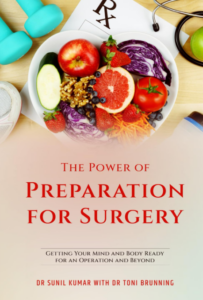 It is rare for a healthcare book to successfully appeal to two quite different audiences simultaneously. This new book, by anaesthetists Dr Sunil Kumar and Dr Toni Brunning, is the exception to that rule.
It is rare for a healthcare book to successfully appeal to two quite different audiences simultaneously. This new book, by anaesthetists Dr Sunil Kumar and Dr Toni Brunning, is the exception to that rule.
For patients, it offers valuable knowledge and reassurance about what to expect during the lead in time for an operation, how to prepare mentally and physically and the importance of shared decision making.
For healthcare services and in turn their workforce, it will help educate and empower staff to give tips, encouragement and confidence to patients. Health workers could help translate the simple, practical advice and very few clearly explained caveats to individual patients. After all, we do have a role as health workers, to help patients help themselves. Healthcare services may consider formulating a business case to purchase multiple copies for staff education.
This book provides a succinct overview of how to prepare for surgery and most importantly why these steps will be beneficial. It covers: smoking cessation, exercise, nutrition, alcohol moderation, medication review with senior input, psychological and mental health optimisation and practical preparation – the 7 things proven to reduce complications by up to 50% as highlighted by the Centre for Perioperative Care. Details include the benefit of mindfulness, how to manage relationships, the importance of social support and the psychological burden of surgery. Having access to this information all in one place is extremely useful.
Long waiting lists are an increasing issue for health care and health leaders. This book seeks to view this as preparation time as opposed to waiting time. Such an approach is likely to reduce complications, admissions to critical care, re-operations, re-admissions and extended lengths of stay. More patients could also be treated on a day case basis. It could therefore have huge benefits to the service overall. There may also be long-term benefits, because the 7 key measures that it explores are the same as those that improve health in general. “The Power of Preparation for Surgery” explains how to improve “healthspan” or quality of life, rather than lifespan. Many of the 7 areas that patients themselves can work on may also help improve their functional status from any medical diagnoses that have been the traditional focus of preassessment for healthcare professionals. The aim is to achieve the best possible outcome.
For patients, the second half of the book clearly describes processes before and after surgery, with clear explanations of the pre-operative work up, types of anaesthesia and general risks. It also provides detailed information about the structure of the NHS and how patients are prioritised on waiting lists, thereby demystifying pathways. The book carefully balances the dilemma of where to draw a line separating essential topics from those which are ‘nice to have’. Medical processes including wound healing, and the systemic effect of surgery are comprehensively discussed, easing potential patient anxieties. It gives an example 6-week prehabilitation plan and checklists covering both physical and psychological support, recognising the important role the mind has on our recovery. The book also emphasises that recovery from surgery is often non-linear and gives reassurance that this is a recognised process. It addresses information that is often thought of just after hospital appointments when patients realise questions they wished they had asked but had not thought of in the moment, both before and after surgery. Knowledge is empowering and this book will enable patients to engage with the pre- and post-operative process, to ask questions and genuinely be part of shared decision making.
While everyone has different preferences for reading, this book does contain lengthy pages of text without tables, pictures or graphs. Perhaps a different layout would have helped here. Acknowledging the variety of appetites for reading we all have, there is an audio version that may prove popular.
Overall, “The Power of Preparation for Surgery” acts as a valuable resource for patients, their relatives and carers, and healthcare staff about how to optimise surgical outcomes and experiences. It provides education that may reduce stress in the pre- and post-operative period and therefore, potentially improves healthspan. Engagement with this book by patients and health workers may reduce complications of surgery, empower patients and reduce waiting lists. A win win all round.
Book details
Book title: The Power of Preparation for Surgery: Getting Your Mind and Body Ready for an Operation and Beyond
Authors: Dr Sunil Kumar and Dr Toni Brunning
Publisher: Independently Published
ISBN: 9798878187879
Format: paperback, 184 pages
Reviewers:

Eleanor Kissin
Eleanor Kissin is a senior orthopaedic trainee on the South East Thames rotation. She is enthusiastic about leadership within the NHS and has been awarded both the King’s Leadership Award and the King’s Orthopaedic Research and Education Prize.

Lawrence Mudford
Lawrence Mudford is a patient representative for the Centre for Perioperative Care.

Professor Scarlett McNally
Professor McNally is an orthopaedic surgeon, Deputy Director of the Centre for Perioperative Care, BMJ columnist and President of the Medical Women’s Federation.
Declaration of interests
I have read and understood the BMJ Group policy on declaration of interests and declare the following interests: Although Scarlett and Lawrence have roles at CPOC, this book review is written in a personal capacity, not on behalf of CPOC. They have met the book authors socially, who are both council members of the Royal College of Anaesthetists